【BBC六分钟英语】新生婴儿之间如何交流?
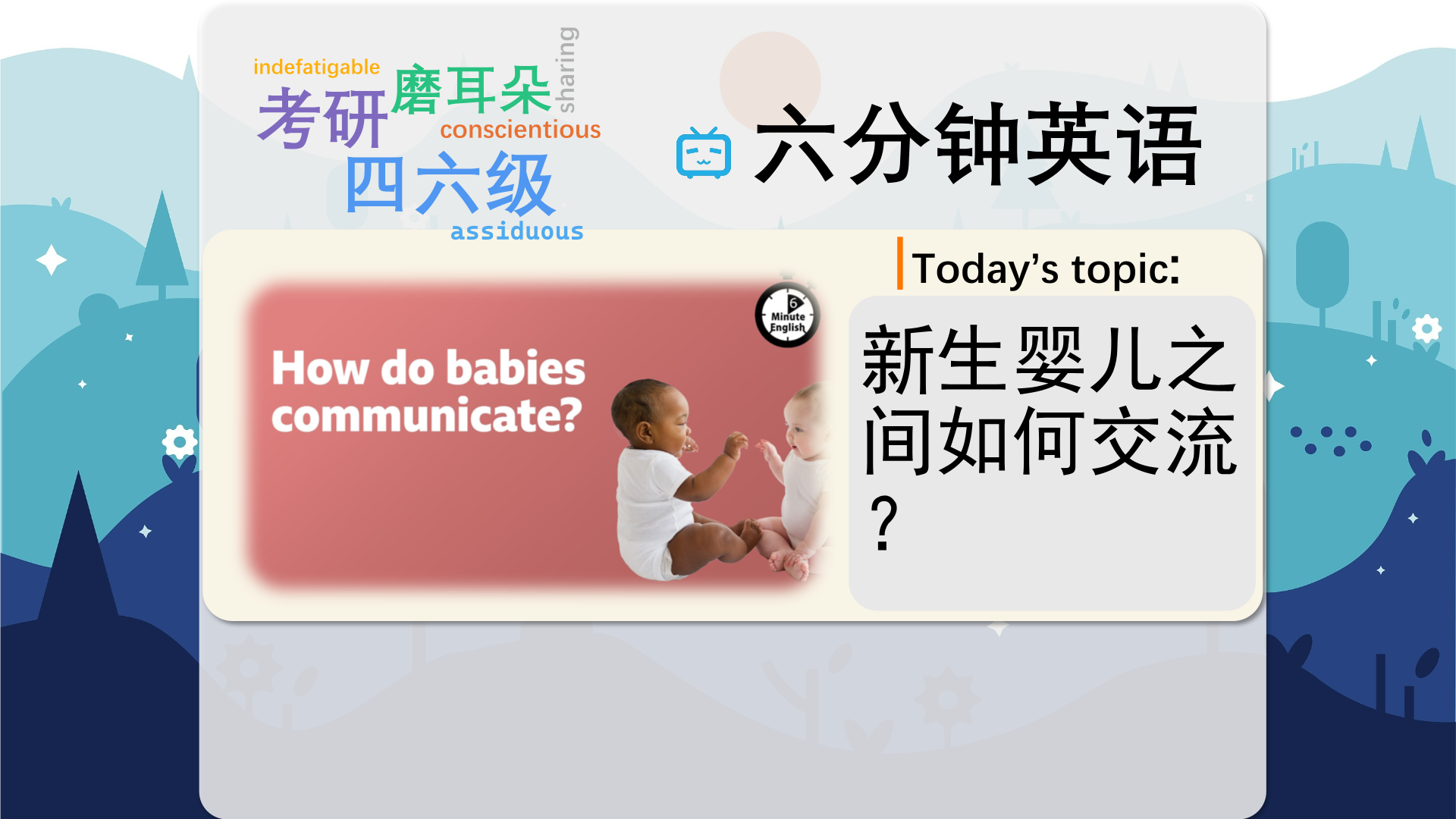
【英文脚本】
Neil
Hello. This is 6 Minute English from BBC Learning English. I’m Neil.
Beth
And I’m Beth. As an adult, when I need to tell somebody something, I just open my mouth and speak. Neil, I’m hungry.
Neil
Ahh, you’d better get something to eat then. And when I want something, it’s the same, I just ask. Erm, can you pass me that pen, please Beth?
Beth
There you go! So that’s now, but as babies, we’re not able to speak, we can only communicate with our bodies or by crying. We can’t clothe, feed or wash ourselves, we rely on others totally for our survival.
Neil
We’ve all been one, but how do newborn babies tell Mum and Dad what’s going on before they can speak? That’s what we’ll be investigating in this episode, along with some useful new vocabulary, all of which you can find on our website, bbclearningenglish.com.
Beth
Baby communication is a topic child psychotherapist Marie Derome writes about in her new book, What Your Baby Wants You to Know. So, what do newborn babies want us to know? Well, here’s Marie’s answer:
Marie Derome
I think they want us to know that they need us one hundred percent, because without us, they won’t survive.
Neil
Without someone caring for them, babies wouldn’t survive, so on a basic level every baby is saying, “Take care of me!” Marie says babies need us one hundred percent. She uses the phrase one hundred percent to emphasise that what she said is completely true.
Beth
And we’ll hear more soon, but first I have a question for you, Neil. Although they look small and helpless, babies are born with some amazing abilities. So, which of the following statements about newborn babies is true: a) babies are born with a full set of teeth, b) babies’ eyes change colour, or c) babies have the same number of bones as an adult?
Neil
Ooh, that’s an interesting question. I think I know the answer, though. I’m going to go with b) babies’ eyes change colour.
Beth
OK. Well, we’ll find out if that’s right at the end of the programme. Now, if you’ve spent time with a baby, you’ve probably noticed how much they move their little arms and legs. Here, Marie Derome explains the meaning of these movements to BBC Radio 4 programme, Woman’s Hour.
Marie Derome
75% of their movements are intentional, synchronised. They’re not jerky, you know, to the naked eye they appear very jerky, but they’re not. They’re there to bring us in, the parents, you know, they need us… so all those movements are there to say, “Look! Come! Look at me. I need you. I want to, you know, to play with you.”
Neil
Babies move their arms and legs to create a bond with their parents. To the naked eye, these movements look jerky, an adjective meaning sudden and quick, not smooth-flowing. The phrase to the naked eye means in a way that can be seen without special instruments, like a microscope, or is seen in the way an ordinary person would.
Beth
In reality, these jerky movements are intentional, meaning that they are planned and done for a particular purpose, to catch their parents’ attention so they will be noticed and cared for.
Neil
Marie’s book is aimed at new parents who are learning to understand their baby’s body language, but she also has advice for parents who are finding it difficult to bond with their newborn, as she explains here to BBC Radio 4 programme, Woman’s Hour.
Marie Derome
Parenting is really hard. Falling in love with this little baby is not… you know, this idea of love at first sight, I think it’s such an unhelpful cliché. It will take time to love that baby, to get to know that baby…
Beth
Many new parents dream about falling in love with their baby at first sight. The idiom love at first sight means being in love with someone as soon as you see them for the first time.
Neil
But Marie thinks this ideal dream can cause problems. She calls it an unhelpful cliché. A cliché is an overused phrase or comment that has been said so much that it’s become unoriginal and uninteresting, and in some cases unhelpful, for example by creating unrealistic expectations, or by making parents feel guilty they are not doing enough.
Beth
Marie says it takes time to get to know a newborn baby and to fall in love. But for most parents, all the misunderstandings, sleepless nights and dirty nappies are worth it for their amazing baby.
Neil
And speaking of amazing babies, what was the correct answer to your question, Beth?
Beth
Well, the correct statement was that babies’ eyes change colour. I think you got that right, Neil.
Neil
I did! It’s an amazing fact, but apparently true.
Beth
Yes, indeed. OK. So, let’s recap the vocabulary we’ve learnt in this episode, starting with the phrase one hundred percent, which can be used to emphasise that you completely agree with something, or that you consider something to be completely right or wrong.
Neil
If you describe a movement as jerky, you mean it moves suddenly in stops and starts, rather than flowing smoothly.
Beth
The adjective intentional means planned and purposeful.
Neil
The phrase to the naked eye means in a way that can be seen without special instruments, or to someone without special knowledge.
Beth
The idiom love at first sight describes the experience of starting to love someone as soon as you see them for the first time.
Neil
And finally, an unhelpful cliché is an overused phrase or comment, a cliché – which has the effect of creating unhelpful or unrealistic attitudes. Once again, our six minutes are up, but remember you can find many more episodes, plus a quiz and worksheet for this one, on our website, bbclearningenglish.com. Goodbye for now!
Beth
Bye!
【中英文双语脚本】
Neil(尼尔)
I’m Neil.
你好。这是来自 BBC Learning English 的六分钟英语。我是 Neil。
Beth(贝丝)
And I’m Beth. As an adult, when I need to tell somebody something, I just open my mouth and speak. Neil, I’m hungry.
我是贝丝。作为一个成年人,当我需要告诉别人一些事情时,我只是张开嘴说话。尼尔,我饿了。
Neil(尼尔)
Ahh, you’d better get something to eat then. And when I want something, it’s the same, I just ask. Erm, can you pass me that pen, please Beth?
啊,那你最好吃点东西。当我想要什么时,它是一样的,我只是问。呃,你能把那支笔递给我吗,贝丝?
Beth(贝丝)
There you go! So that’s now, but as babies, we’re not able to speak, we can only communicate with our bodies or by crying. We can’t clothe, feed or wash ourselves, we rely on others totally for our survival.
给你!所以现在是这样,但作为婴儿,我们无法说话,我们只能通过我们的身体或哭泣来交流。我们不能自己穿衣、吃饭或洗漱,我们完全依赖他人生存。
Neil(尼尔)
We’ve all been one, but how do newborn babies tell Mum and Dad what’s going on before they can speak? That’s what we’ll be investigating in this episode, along with some useful new vocabulary, all of which you can find on our website, bbclearningenglish.com.
我们都是一体的,但是新生婴儿如何在他们能够说话之前告诉爸爸妈妈发生了什么?这就是我们将在本集中调查的内容,以及一些有用的新词汇,所有这些都可以在我们的网站 bbclearningenglish.com 上找到。
Beth(贝丝)
Baby communication is a topic child psychotherapist Marie Derome writes about in her new book, What Your Baby Wants You to Know. So, what do newborn babies want us to know? Well, here’s Marie’s answer:
婴儿沟通是儿童心理治疗师 Marie Derome 在她的新书《你的宝宝想让你知道什么》中写到的一个话题。那么,新生婴儿想让我们知道什么呢?嗯,这是 Marie 的回答:
Marie Derome(玛丽·德罗姆)
I think they want us to know that they need us one hundred percent, because without us, they won’t survive.
我认为他们想让我们知道,他们需要我们百分之百,因为没有我们,他们就无法生存。
Neil(尼尔)
Without someone caring for them, babies wouldn’t survive, so on a basic level every baby is saying, “Take care of me!” Marie says babies need us one hundred percent. She uses the phrase one hundred percent to emphasise that what she said is completely true.
没有人照顾他们,婴儿就无法生存,所以在基本层面上,每个婴儿都在说,’照顾我!玛丽说婴儿百分之百需要我们。她用百分之百这个词来强调她所说的是完全正确的。
Beth(贝丝)
And we’ll hear more soon, but first I have a question for you, Neil. Although they look small and helpless, babies are born with some amazing abilities. So, which of the following statements about newborn babies is true: a) babies are born with a full set of teeth, b) babies’ eyes change colour, or c) babies have the same number of bones as an adult?
我们很快就会听到更多消息,但首先我有一个问题要问你,Neil。虽然他们看起来很小而且无助,但婴儿天生就具有一些惊人的能力。那么,以下关于新生儿的陈述中哪一项是正确的:a) 婴儿出生时就有一整套牙齿,b) 婴儿的眼睛会变色,或者 c) 婴儿的骨骼数量与成人相同?
Neil(尼尔)
Ooh, that’s an interesting question. I think I know the answer, though. I’m going to go with b) babies’ eyes change colour.
哦,这是一个有趣的问题。不过,我想我知道答案。我要去 b) 婴儿的眼睛会变色。
Beth(贝丝)
OK. Well, we’ll find out if that’s right at the end of the programme. Now, if you’ve spent time with a baby, you’ve probably noticed how much they move their little arms and legs. Here, Marie Derome explains the meaning of these movements to BBC Radio 4 programme, Woman’s Hour.
还行。好吧,我们会在节目结束时发现这是否正确。现在,如果您花时间陪伴婴儿,您可能已经注意到他们活动小胳膊和小腿的次数。在这里,Marie Derome 向 BBC Radio 4 节目 Woman’s Hour 解释了这些动作的含义。
Marie Derome(玛丽·德罗姆)
75% of their movements are intentional, synchronised. They’re not jerky, you know, to the naked eye they appear very jerky, but they’re not. They’re there to bring us in, the parents, you know, they need us… so all those movements are there to say, “Look! Come! Look at me. I need you. I want to, you know, to play with you.”
他们 75% 的动作是有意的、同步的。他们并不生涩,你知道,肉眼看来他们看起来非常生涩,但事实并非如此。他们在那里把我们带进来,父母,你知道的,他们需要我们……所以所有这些动作都是为了说,’看!来!看着我。我需要你。我想,你知道的,和你一起玩。
Neil(尼尔)
Babies move their arms and legs to create a bond with their parents. To the naked eye, these movements look jerky, an adjective meaning sudden and quick, not smooth-flowing. The phrase to the naked eye means in a way that can be seen without special instruments, like a microscope, or is seen in the way an ordinary person would.
婴儿会移动他们的手臂和腿,以与父母建立联系。肉眼看来,这些动作看起来很生涩,这个形容词的意思是突然而迅速,而不是流畅的。肉眼一词的意思是无需特殊仪器(如显微镜)即可看到的方式,或者以普通人的方式看到。
Beth(贝丝)
In reality, these jerky movements are intentional, meaning that they are planned and done for a particular purpose, to catch their parents’ attention so they will be noticed and cared for.
实际上,这些生涩的动作是有意为之的,这意味着它们是为特定目的而计划和完成的,以引起父母的注意,以便他们受到关注和照顾。
Neil(尼尔)
Marie’s book is aimed at new parents who are learning to understand their baby’s body language, but she also has advice for parents who are finding it difficult to bond with their newborn, as she explains here to BBC Radio 4 programme, Woman’s Hour.
Marie 的书是针对正在学习理解宝宝肢体语言的新父母的,但她也为那些发现难以与新生儿建立联系的父母提供建议,正如她在 BBC Radio 4 节目 Woman’s Hour 中解释的那样。
Marie Derome(玛丽·德罗姆)
Parenting is really hard. Falling in love with this little baby is not… you know, this idea of love at first sight, I think it’s such an unhelpful cliché. It will take time to love that baby, to get to know that baby…
育儿真的很难。爱上这个小宝贝并不是……你知道,这种一见钟情的想法,我认为这是一个无益的陈词滥调。爱那个孩子,了解那个孩子需要时间……
Beth(贝丝)
Many new parents dream about falling in love with their baby at first sight. The idiom love at first sight means being in love with someone as soon as you see them for the first time.
许多新父母梦想着对他们的宝宝一见钟情。谚语 Love at first sight 的意思是第一次见到某人就爱上了他们。
Neil(尼尔)
But Marie thinks this ideal dream can cause problems. She calls it an unhelpful cliché. A cliché is an overused phrase or comment that has been said so much that it’s become unoriginal and uninteresting, and in some cases unhelpful, for example by creating unrealistic expectations, or by making parents feel guilty they are not doing enough.
但玛丽认为这个理想的梦想可能会带来问题。她称这是无益的陈词滥调。陈词滥调是一个被过度使用的短语或评论,它被说得太多了,以至于它变得没有原创性和无趣性,在某些情况下是无益的,例如通过创造不切实际的期望,或者让父母感到内疚,因为他们做得不够。
Beth(贝丝)
Marie says it takes time to get to know a newborn baby and to fall in love. But for most parents, all the misunderstandings, sleepless nights and dirty nappies are worth it for their amazing baby.
Marie 说,了解新生婴儿和坠入爱河需要时间。但对于大多数父母来说,所有的误解、不眠之夜和肮脏的尿布对于他们出色的宝宝来说都是值得的。
Neil(尼尔)
And speaking of amazing babies, what was the correct answer to your question, Beth?
说到神奇的婴儿,贝丝,你的问题的正确答案是什么?
Beth(贝丝)
Well, the correct statement was that babies’ eyes change colour. I think you got that right, Neil.
嗯,正确的说法是婴儿的眼睛会改变颜色。我想你说对了,Neil。
Neil(尼尔)
I did! It’s an amazing fact, but apparently true.
我做了!这是一个惊人的事实,但显然是真的。
Beth(贝丝)
Yes, indeed. OK. So, let’s recap the vocabulary we’ve learnt in this episode, starting with the phrase one hundred percent, which can be used to emphasise that you completely agree with something, or that you consider something to be completely right or wrong.
确实是的。还行。那么,让我们回顾一下我们在这一集中学到的词汇,从短语 100% 开始,它可以用来强调你完全同意某件事,或者你认为某件事完全正确或错误。
Neil(尼尔)
If you describe a movement as jerky, you mean it moves suddenly in stops and starts, rather than flowing smoothly.
如果你把一个动作描述为生涩的,你的意思是它突然停止和开始移动,而不是平稳地流动。
Beth(贝丝)
The adjective intentional means planned and purposeful.
形容词 intentional 的意思是有计划的和有目的的。
Neil(尼尔)
The phrase to the naked eye means in a way that can be seen without special instruments, or to someone without special knowledge.
肉眼一词的意思是在没有特殊仪器的情况下可以看到,或者对没有特殊知识的人来说。
Beth(贝丝)
The idiom love at first sight describes the experience of starting to love someone as soon as you see them for the first time.
谚语 love at first sight 描述了你第一次看到一个人就开始爱他们的经历。
Neil(尼尔)
And finally, an unhelpful cliché is an overused phrase or comment, a cliché – which has the effect of creating unhelpful or unrealistic attitudes. Once again, our six minutes are up, but remember you can find many more episodes, plus a quiz and worksheet for this one, on our website, bbclearningenglish.com. Goodbye for now!
最后,无益的陈词滥调是过度使用的短语或评论,陈词滥调 – 它会产生无益或不切实际的态度。再一次,我们的六分钟结束了,但请记住,您可以在我们的网站上找到更多剧集,以及本集的测验和工作表,bbclearningenglish.com。再见!
Beth(贝丝)
Bye!
再见!




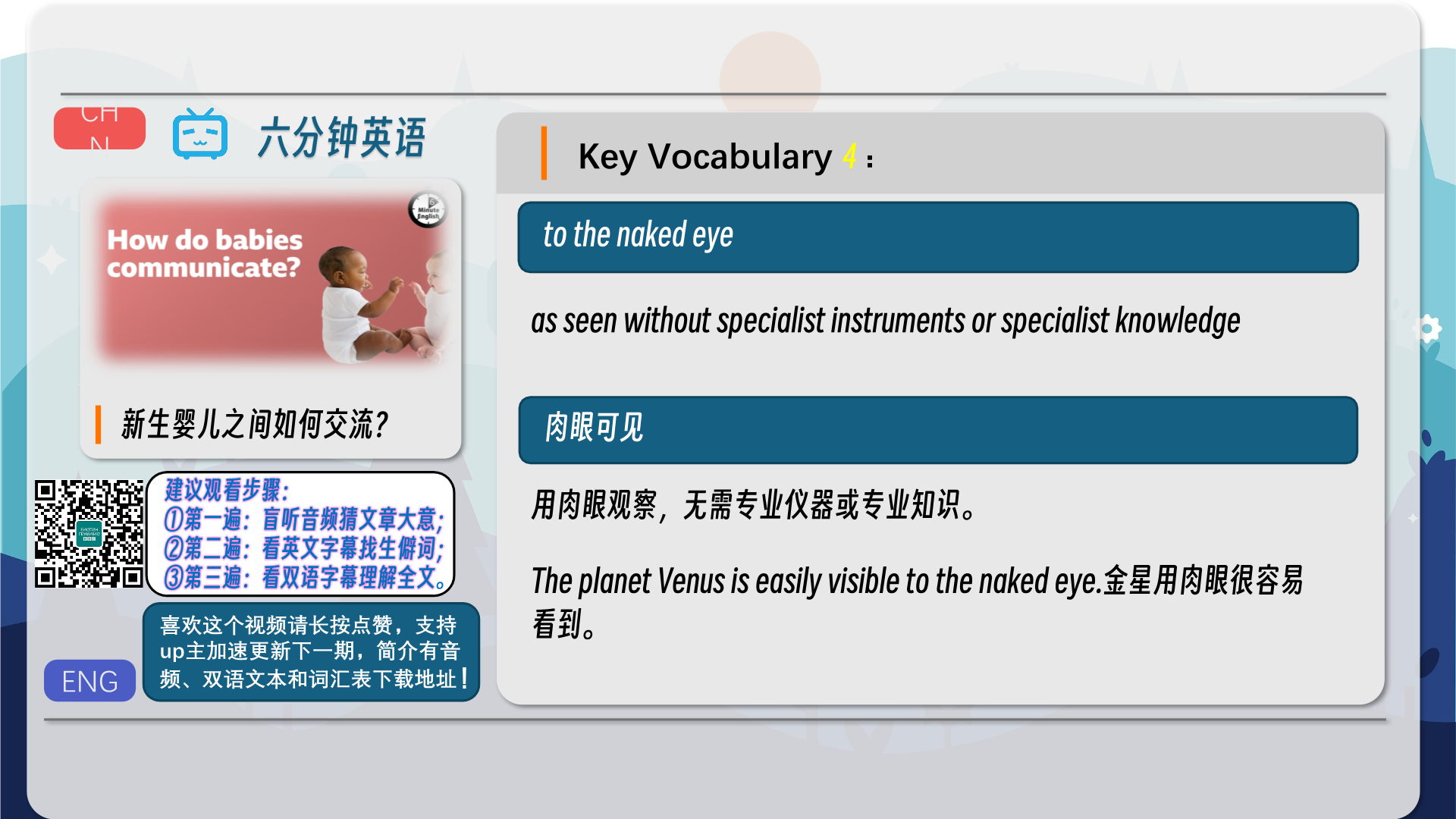

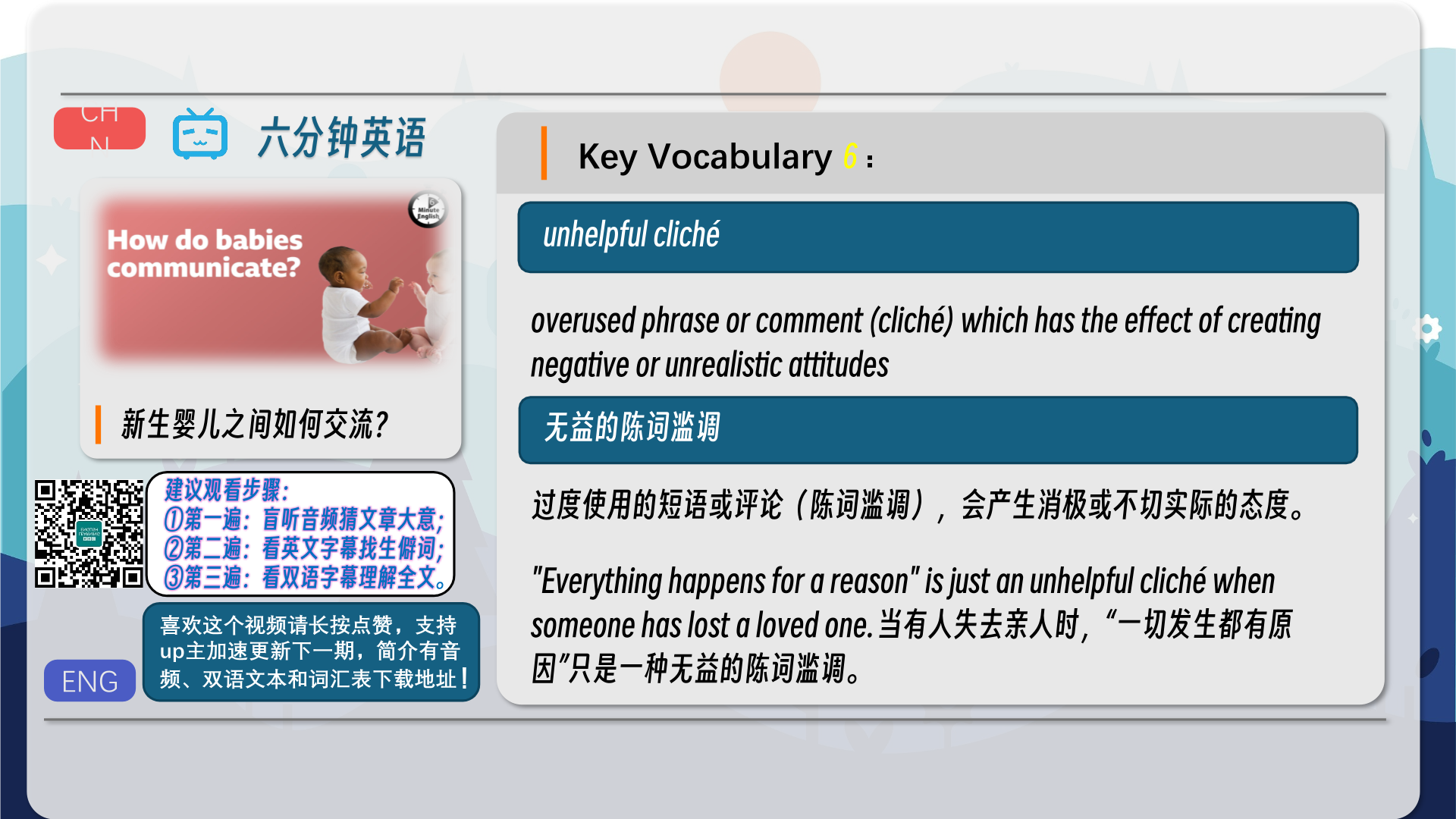

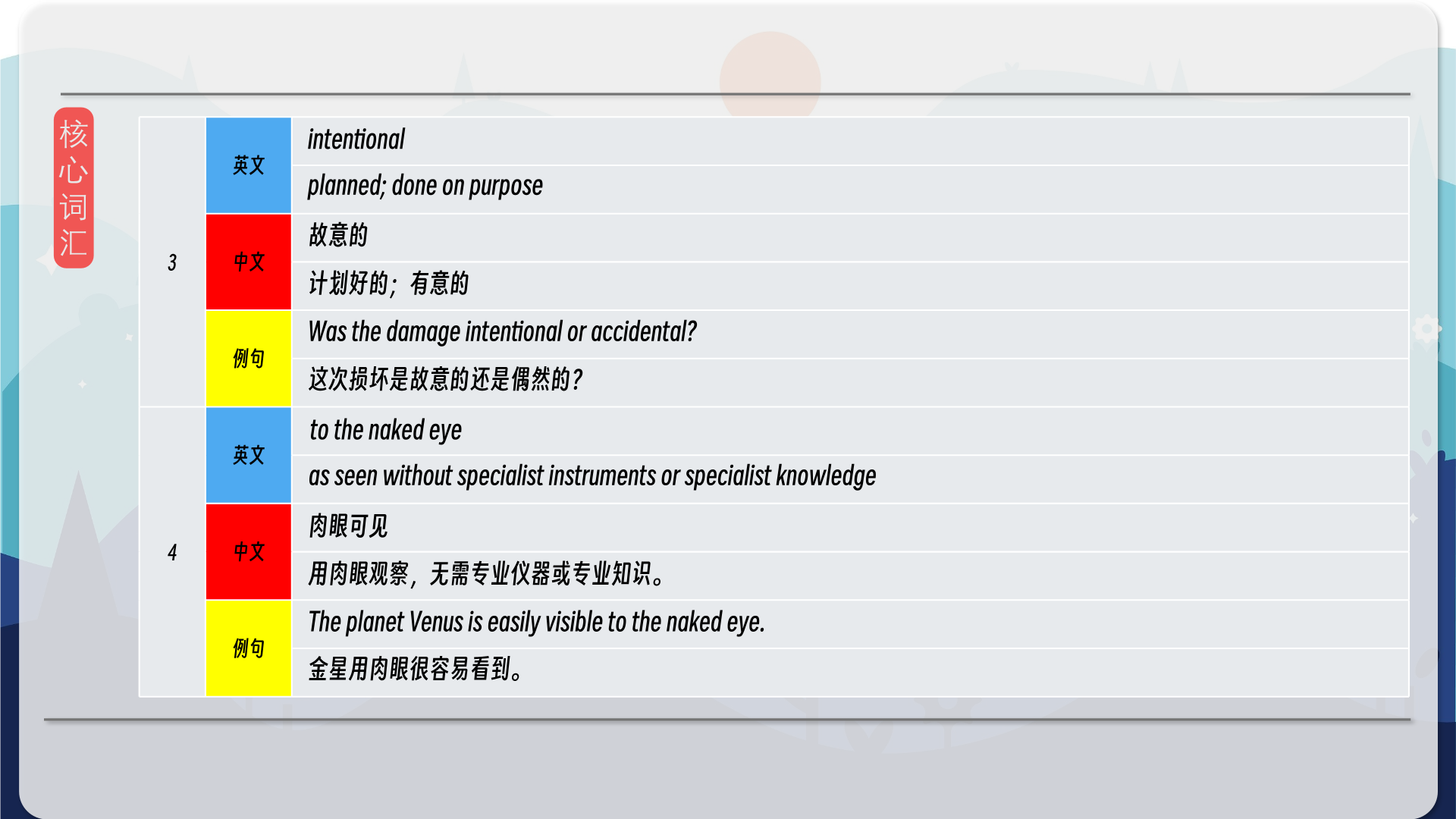

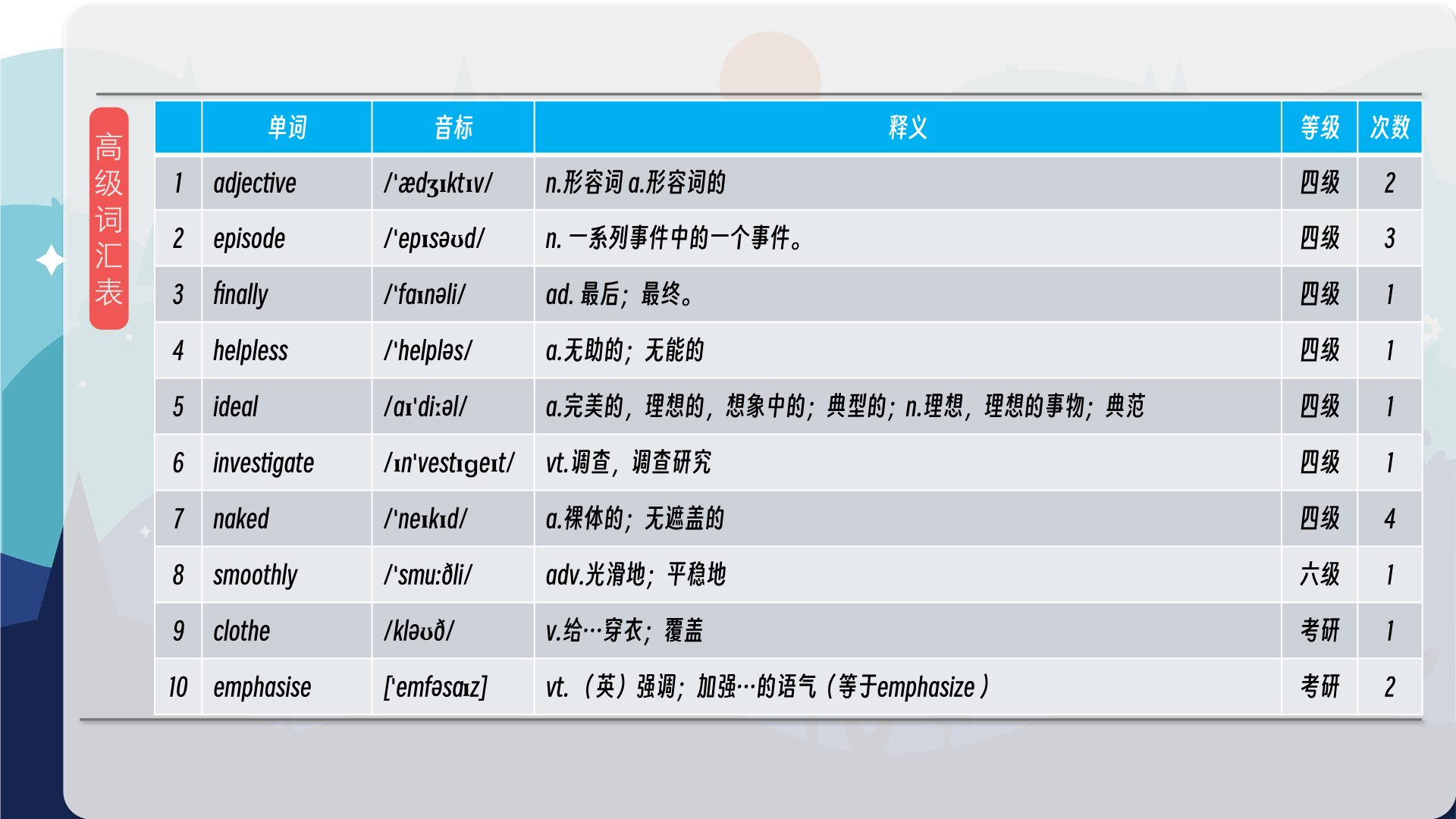
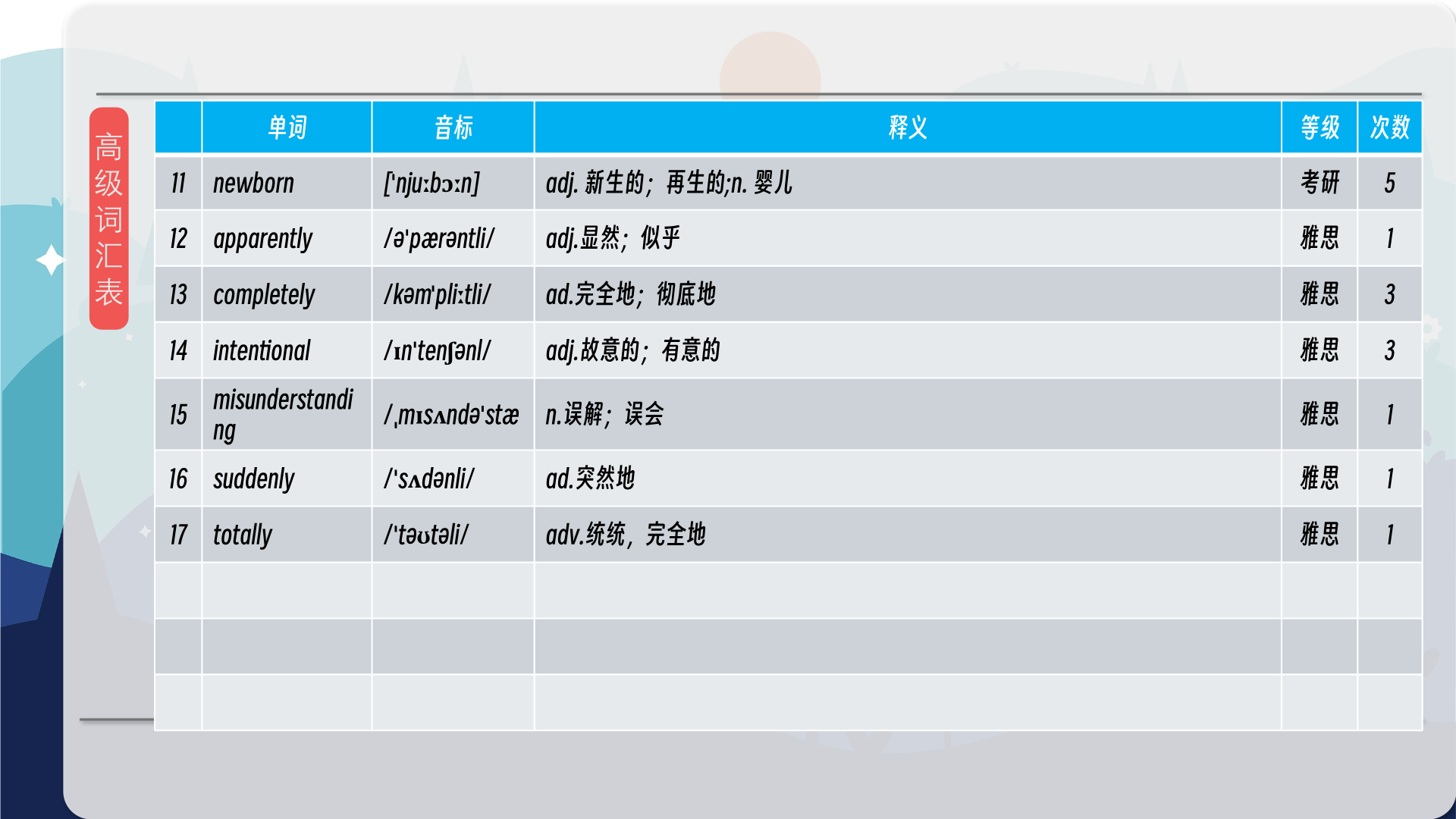

【核心词汇】
one hundred percent
used to emphasise that you agree completely with something, or that it is completely right or wrong
完全同意
用于强调你完全同意某事,或某事完全正确或错误。
I’m one hundred percent behind you.
我百分之百支持你。
jerky
quick and sudden; stopping and starting, rather than smooth-flowing
急促的
快速而突然的;断断续续的,而非流畅的
The car made a jerky movement forward.
汽车向前猛地一动。
intentional
planned; done on purpose
故意的
计划好的;有意的
Was the damage intentional or accidental?
这次损坏是故意的还是偶然的?
to the naked eye
as seen without specialist instruments or specialist knowledge
肉眼可见
用肉眼观察,无需专业仪器或专业知识。
The planet Venus is easily visible to the naked eye.
金星用肉眼很容易看到。
love at first sight
(idiom) experience of starting to love someone as soon as you see them for the first time
一见钟情
(习语)第一次见到某人时就开始爱上他们的体验。
It wasn’t exactly love at first sight – more a slow and gradual thing.
这算不上是一见钟情,而是一种缓慢渐进的过程。
unhelpful cliché
overused phrase or comment (cliché) which has the effect of creating negative or unrealistic attitudes
无益的陈词滥调
过度使用的短语或评论(陈词滥调),会产生消极或不切实际的态度。
“Everything happens for a reason” is just an unhelpful cliché when someone has lost a loved one.
当有人失去亲人时,“一切发生都有原因”只是一种无益的陈词滥调。
在公众号里输入6位数字,获取【对话音频、英文文本、中文翻译、核心词汇和高级词汇表】电子档,6位数字【暗号】在文章的最后一张图片,如【220728】,表示22年7月28日这一期。公众号没有的文章说明还没有制作相关资料。年度合集在B站【六分钟英语】工房获取,每年共计300+文档,感谢支持!